Try These Hummingbird Vines: 8 Best Flowering Vines For Hummingbirds
Want to improve your chances of attracting some of the world’s most charming avian visitors? Here are the best eight flowering vines for hummingbirds
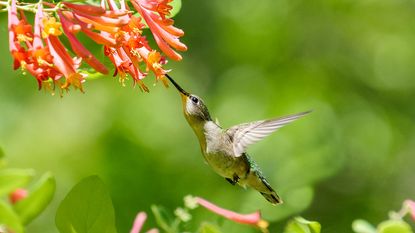

Planting flowering vines for hummingbirds is an easy way to attract them as well as beautify the landscape. Hummers serve as a welcome addition to a variety of spaces. This includes porches, patios and even balconies where gardeners can observe the agile creatures more closely. Types of vines that attract hummingbirds vary greatly in size and appearance, with most being well-adapted to growth in pots and containers. Here are some of the vines most likely to bring on the hummers!
Choosing the Best Flowering Vines for Hummingbirds
Vine flowers that attract hummingbirds are numerous, but gardeners should look for those that are rich in nectar, the sugary substance on which the birds feed. Many of these vining species feature distinctive tubular flowers in vibrant shades of red, pink or orange. Researching each type independently can give you some valuable insight into the suitability of the plant. In this guide, we’ll explore some of the best vines that attract hummingbirds, plus a few ways to maximize their flowering potential.
1. Black-Eyed Susan Vine
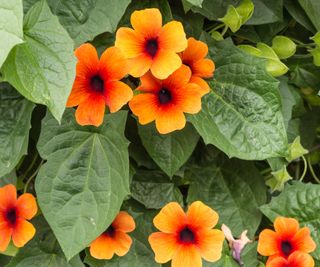
Tender to frost, the black-eyed Susan vine (Thunbergia alata) is most commonly grown as an annual. Sprawling plants cover trellises quickly, producing large numbers of small five-petaled blooms. Yellow flowers with a characteristic black eye are the most common varieties. However, open-pollinated varieties include those budding in fantastic shades of blush, burgundy and pink.
2. Clematis
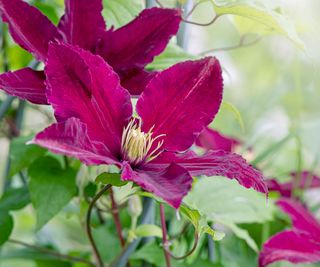
Clematis vines are known for their attractive foliage and stunning blooms. But, do hummingbirds like clematis vines? The answer to this question is a resounding yes! Hardy to USDA zones 4-9, species are well-suited to a range of climates and garden growing conditions. This includes beds and containers that receive full sun, as well as those situated in shade. Learning more about each specific clematis cultivar is essential to the plant’s care, as their needs and preferences can differ.
3. Coral Honeysuckle
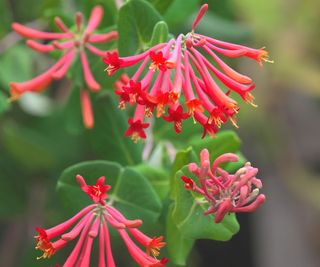
Also known as hummingbird honeysuckle, coral honeysuckle (Lonicera sempervirens) this one is a native flowering vine hardy to USDA zones 4-9. These plants differ from invasive types, behaving well in cultivation, producing brilliant coral-red blooms. In addition to being one of the best vines for hummingbirds, this unique honeysuckle is known to attract both butterflies and various species of songbirds to the garden.
4. Cypress Vine
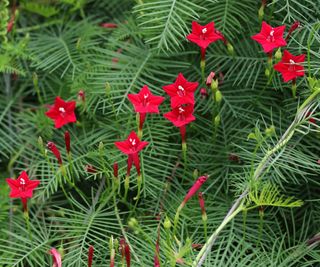
A member of the morning glory family, Ipomoea quamoclit is loved for its vivid blooms and fine, fern-like foliage. They are most commonly grown as an annual, quickly reaching lengths of up to 20 feet (6m). The vines are best planted where they can climb a sturdy trellis or support system. The same can also be said if growing cypress vines grown in containers, with gardeners making certain to select only the sturdiest of pots.
5. Mandevilla
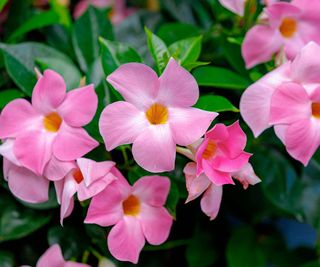
Mandevilla plants will behave as perennials throughout USDA growing zones 9-11. However, many have found success keeping the plants in containers, provided they are protected from sudden drops in temperature. With their combination of bright colors and large flowers, gardeners can expect mandevilla vines to attract numbers of hummingbirds with ease. This plant is also a good choice for those hoping to lure bees, butterflies and other beneficial insects to their growing space.
Gardening tips, videos, info and more delivered right to your inbox!
Sign up for the Gardening Know How newsletter today and receive a free download of our most popular eBook "How to Grow Delicious Tomatoes."
6. Passionflower Vine
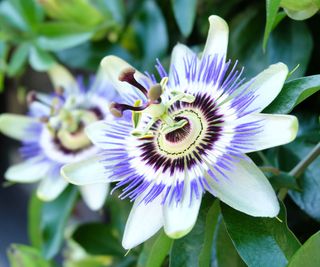
Passionflower vine (Passiflora incarnata) is native to much of the southeastern United States. Vines can be found trailing across meadows, woodland edges, and near roadsides. Though the plant’s foliage may go unnoticed, its characteristic flowers open to display a surprising form. As well as being gorgeous flowering vines for hummingbirds, these passionflower varieties are highly resistant to disease and only seldom suffer damage from insects or browsing animals.
7. Scarlet Runner Bean
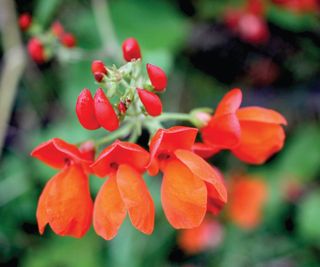
As well as being a popular addition to edible gardens, scarlet runner beans are some of the best flowering vines for hummingbirds. Producing an abundance of red pea-like flowers, they continue to produce throughout the summer, lasting until the arrival of the first frost in fall. This makes Phaseolus coccineus especially popular among hummingbirds and species that depend upon it as a reliable source of food.
8. Trumpet Vine
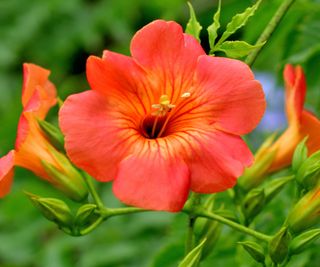
Sometimes known as trumpet creeper, Campsis radicans grows throughout much of the eastern United States. Large trumpet vines reach immense sizes, requiring extensive measures of support when cultivated in the landscape. Gardeners choosing to grow the vine report large clusters of impressive trumpeted blooms in yellow, orange and deep red tones.
Frequently Asked Questions
Where is the Best Place to Plant a Hummingbird Vine?
Hummingbird vines can be grown in a variety of ways. Many gardeners choose to plant directly into beds, making sure to allow ample room as the vines reach maturity. Adequate support and proximity to other garden structures should also be considered. Raised beds, hanging baskets and other types of containers can also be used to grow flowering vines for hummingbirds.
What is a Hummingbird’s Favorite Plant?
Most experienced gardeners agree that the best way to determine which plants are a favorite of hummingbirds is through diversifying the landscape. By growing several species, you can determine which plants the birds may favor and frequent most often.

Tonya Barnett has been gardening for 13 years. Flowers are her passion. She has trasformed her backyard into a cut flower garden, which she regularly chronicles on her YouTube channel http://www.youtube.com/@tonyawiththeflowers.
-
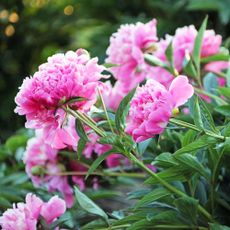 How To Keep Peonies From Falling Over: 5 Fixes For Floppy Flowers
How To Keep Peonies From Falling Over: 5 Fixes For Floppy FlowersPeonies are cottage garden favorites, but they can be prone to flopping. Support peonies with these practical ideas that can double as attractive features.
By Melanie Griffiths
-
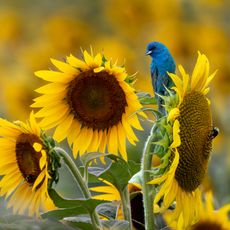 9 Bird-Friendly Flowering Plants: Flowers That Attract Birds Through The Seasons
9 Bird-Friendly Flowering Plants: Flowers That Attract Birds Through The SeasonsChoose the right flowering plants and your garden will become a favorite hangout for avian visitors. Try these nine flowers that attract birds to your yard
By Tonya Barnett
-
 9 Bird-Friendly Flowering Plants: Flowers That Attract Birds Through The Seasons
9 Bird-Friendly Flowering Plants: Flowers That Attract Birds Through The SeasonsChoose the right flowering plants and your garden will become a favorite hangout for avian visitors. Try these nine flowers that attract birds to your yard
By Tonya Barnett
-
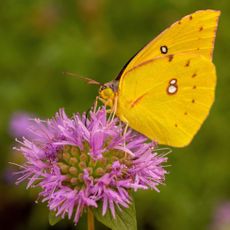 Support California Dogface Butterfly: Do More For Zerene Eurydice
Support California Dogface Butterfly: Do More For Zerene EurydiceWould you like to know how to support California’s state insect? We explain the vital pollinating role of the California dogface butterfly and how to help it in your backyard
By Teo Spengler
-
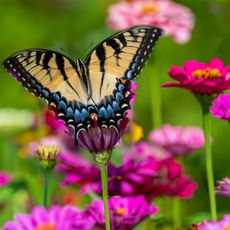 Beautiful Butterfly Garden Ideas: 10 Ways To Attract Pretty Pollinators To Your Yard
Beautiful Butterfly Garden Ideas: 10 Ways To Attract Pretty Pollinators To Your YardBringing butterflies to your backyard is one of the most important ways you can enhance wildlife, boost pollination and improve biodiversity. These 10 butterfly garden ideas can get you started
By Mary Ellen Ellis
-
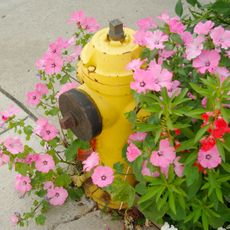 Landscaping Around A Fire Hydrant: Landscaping Tips And Safety Considerations
Landscaping Around A Fire Hydrant: Landscaping Tips And Safety ConsiderationsIt might not sound like the obvious choice for a landscaping project, but a fire hydrant can work with a bigger gardening vision. Follow our tips on landscaping around a fire hydrant
By Mary Ellen Ellis
-
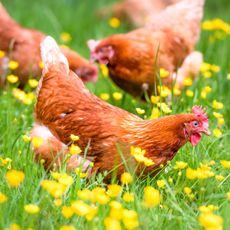 Planting For Chickens: Why You Should Plant A Chicken Garden
Planting For Chickens: Why You Should Plant A Chicken GardenIf you’ve never considered planting for chickens, this is your chance to enjoy their joyful benefits. We show you how to make an easy chicken garden
By Amy Grant
-
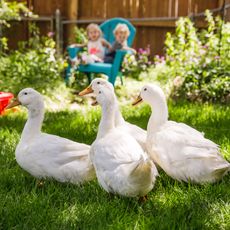 Why It's Time To Raise Ducks For The Garden – Move Over, Chickens!
Why It's Time To Raise Ducks For The Garden – Move Over, Chickens!Others might call you quackers, but if you get some ducks for the garden, you can enjoy a host of plot-friendly benefits. Just follow our expert guide to make the most of these unique creatures
By Mary Ellen Ellis
-
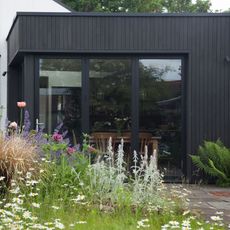 Dark Home Exterior? Choose The Right Plants With Our Expert Dark House Landscaping Tips
Dark Home Exterior? Choose The Right Plants With Our Expert Dark House Landscaping TipsIf the front or back of your house is very dark, what are the implications for the plants you grow? We reveal how understanding dark house landscaping can help you pick the right plants
By Susan Albert
-
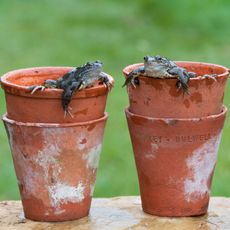 Best Plants For Frogs: 7 Plant Varieties To Bring More Froggies To Your Yard
Best Plants For Frogs: 7 Plant Varieties To Bring More Froggies To Your YardA frog-friendly environment is one of the key indicators for garden health – so if you want to improve the health of your plot, here are seven plants for frogs you need to try
By Janey Goulding